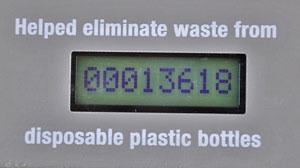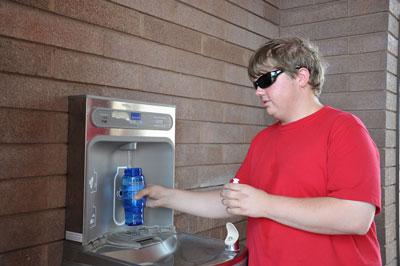Editor's note: Due to concerns from the Haws Corporation, which has trademarked the phrase "Hydration Station," this story has been edited to remove those two words as they appear back to back.
A new water-filling station at the main visitor center for Lake Mead National Recreation Area has been in service for six months, and in addition to reducing the use of disposable plastic water bottles, use of the filtered water is proving popular with visitors. Since it's installation, the station has been used to fill 13,600 water bottles.
You'd expect to find a drinking fountain at any park visitor center'especially one in the desert'and this filling station does that job nicely, plus a little more. It works just like a standard drinking fountain but also has a shelf for easy filling of water bottles. A sensor initiates the water fill, and every time a bottle is filled, that action is automatically counted and displayed on the station.
'Word is getting around that this is the place to stop and refill your water bottle, which with the heat and everything else, that's a really good message to have,' said Michelle Riter, a Lake Mead NRA district interpreter.
Riter said installation of the water-filling station at the Alan Bible Visitor Center is part of the Lake Mead NRA's Climate Friendly Parks action plan to cut down on plastic water bottle waste. This plan includes initiatives to increase visitor use of refillable water bottles, increase number of filling stations in the park and collaborate with the visitor center store to sell less expensive refillable water bottles.
Once the water-refilling station was installed, Riter said they stopped selling bottled water at the visitor center store and began selling more varieties of refillable water bottles. She said the least expensive water bottle is only $2.99 and has the Lake Mead NRA logo on it along with facts about the park.
The Vanlue family, from O'Fallon, Mo., visited the store in early August, purchased a refillable water bottle and filled it at the station. After Jacob, 17, filled up his bottle, his mom, Barbara, said she was thankful for the station and the reduction of plastic water bottle waste in landfills.

A counter automatically records how many times the water bottle portion of the station has been used. NPS photo.
It's not just popular with families and individual visitors. Gabriel Kelsey-Yoder, Western National Parks Association (WNPA) bookstore manager, said large tour groups often stop by the visitor center and have been receptive to purchasing and using the refillable water bottles. She said she has seen campground users come to refill their water bottles at the refilling station as well because they prefer the cold, filtered water.
Park visitors, especially local hikers and bicyclists who use the trails, have been spreading the news about the new refilling station by word of mouth and through social media, Riter added. They are excited to see how many water bottles have been refilled and want refilling stations to be installed in other areas of the park.
Funding for the refilling station was provided by the WNPA. The Alan Bible Visitor Center is located just of US 93 between Boulder City, Nevada, and Hoover Dam.




Comments
Hmmm. Prohibition, use of drugs, vaccines, education requirements, child labor laws, slavery, involuntary servitude, blue laws, marriage laws, import laws, tobacco laws, alcohol laws, etc.
It seems even the first congress got involved in legislating morality. So, whether you agree or not, the federal government does legislate "for the general welfare" and has been doing it for a little over 200 years.
Sorry to digress to a history lesson. The Constitution was formed to LIMIT the power of the federal government. During the period that the Constitution was being ratified, those opposed (the anti-federalists) were concerned that the general welfare clause would be interpreted as you suggest. Those for the Constitution - said nonsense. Not because they wanted the welfare clause to give willy nilly power to the government but because they believed it was clear that the powers were limited to those enumerated in the Constitution. You may recall the name James Madison - the man considered the father of the Constitution. Here are his words on the subject from Federalist Paper 41.
"For what purpose could the enumeration of particular powers be inserted, if these and all others were meant to be included in the preceding general power? Nothing is more natural nor common than first to use a general phrase, and then to explain and qualify it by a recital of particulars."
Congress certainly has since perverted the intent, but that doesn't change the intent.
As to the first Congress, please point me to their enactment of legislation re: " Prohibition, use of drugs, vaccines, education requirements, child labor laws, slavery, involuntary servitude, blue laws, marriage laws, import laws, tobacco laws, alcohol laws, etc." The closest you can come is the Whiskey Act which was a tax to raise revenue to pay debt, not an attempt to force someone's morals on someone else. Even at that, is was strongly resisted.
Ec, I am certainly no expert on any of this discussion regarding the US Constitution, but in my own limited knowledge, you do have a point. "The Constitution does not give us rights: it restrains government from infringing on rights we acquire at birth by virtue of being human beings, "natural rights that are held by natural persons". While Thomas Jefferson felt it important to add a bill of rights to the constitution, Alexander Hamilton spoke strongly against it. The discussion is fascinating, but Hamilton lost the day, Jefferson won, and we do have a Bill of Rights. And, as you pointed out, the only way, other than a supreme court decision, to make explicit "new" rights (such as health care), is through the process of amending the document. There are many examples of this, the 13th, 14th, 15th (the reconstruction amendments), the 16th, (feds right to tax), 17th (direct election of senators), 19th (women's right to vote), etc. Not sure what any of this has to do with NPS Traveler except to say I see your point, but simply do not agree. I am certainly not one who has any great expertise in this area.
rmackie - thank you for the concession on my point, but as you suggest this is getting well off the topic. Well worth discussing but perhaps not in this forum.
To me the real issue here is not the water station but the shutting down of sales of bottled water. Certainly it is in the power of the NPS to do so. The question is, does it make sense to do so i.e is there a real problem, will this action do anything to solve it and are there consequences that offset any benefits.
I am unconvinced that disposable water bottles are a problem. I certainly don't buy the waste of resources or landfill issues as plastic water bottles are a miniscule portion of either the use or disposal of these resources nor do I believe these resources are in jeopardy of exhaustion any time in the foreseeable future. I also don't believe banning sales in the park will have any real benefit, including raising awareness. If you want to raise awareness - put up a sign saying "do not litter" or charge a deposit fee. But eliminating 13,000 bottles (assuming that was actually accomplished) will have absolutely no effect even if there is a problem, which I don't believe there is.
Finally, there are consequences to these actions. Obviously, as reported elsewhere in NPT, water bottles are bought in the hundreds of thousands or even millions in national parks. Obviously the people that have made those purchases have made the decision it is preferable for them to buy at the park than to use a refillable bottle. You may not agree (I don't), but that is our choice and should not be forced on someone else. (This is perhaps the biggest disagreement I have with the folks here on this and many other issues) Secondly, selling bottled water in the parks makes money for the parks. And given the high volume and high margins, it likely makes far more than selling reusable bottles and giving water away free.
If banning sales had no downside, then maybe the "if it just saved one bottle" argument would fly. But it does have a downside and in my mind that downside far outweighs any tiny incremental benefit.
Agreed, dahkota, insofar as the laws it enacts must conform to the Constitution, which is a "moral" document.